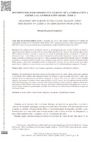Identificador persistente para citar o vincular este elemento:
https://accedacris.ulpgc.es/jspui/handle/10553/114196
| Campo DC | Valor | idioma |
|---|---|---|
| dc.contributor.author | Brandon Fernández, Miriam | en_US |
| dc.date.accessioned | 2022-03-25T14:23:55Z | - |
| dc.date.available | 2022-03-25T14:23:55Z | - |
| dc.date.issued | 2021 | en_US |
| dc.identifier.issn | 2386-6837 | en_US |
| dc.identifier.uri | https://accedacris.ulpgc.es/handle/10553/114196 | - |
| dc.description.abstract | Este artículo expone el drástico cambio de rol protagonizado por las Islas Canarias en cuanto a migraciones en el Atlántico se refiere. De ser una sociedad exportadora de mano de obra durante siglos, en las últimas décadas Canarias ha pasado a convertirse en una de las principales puertas de entrada de la migración africana a Europa. En este trabajo se analizarán brevemente los movimientos migratorios canarios a América, los cuales comenzaron tímidamente en el siglo XIV y fueron ganando intensidad hasta finales del siglo XX. También se expondrá la situación actual de Canarias como sociedad receptora de movimientos migratorios llegados desde África gracias a información recopilada a través de bibliografía y fuentes, así como de entrevistas personales, cuestionarios y charlas con actores sociales en contacto directo con la población africana migrante en Canarias. | en_US |
| dc.description.abstract | This article exposes the drastic change of role carried out by the Canary Islands in terms of migrations in the Atlantic. From being a labor exporting society for centuries, in recent decades the Canary Islands have become one of the main gateways for African migration to Europe. This work will briefly analyze Canarian migratory movements to America, which began timidly in the 14th century and were gaining intensity until the end of the 20th century. The current situation of the Canary Islands as a host society for migratory movements arriving from Africa will also be presented thanks to information collected through bibliography and sources, as well as personal interviews, questionnaires and talks with social actors in direct contact with African migrants in the Canary Islands. | en_US |
| dc.language | spa | en_US |
| dc.publisher | Cabildo Insular de Gran Canaria | en_US |
| dc.source | XXIV Coloquio de Historia Canario-Americana [ISSN 2386-6837] | en_US |
| dc.subject | 520403 Migraciones | en_US |
| dc.subject | 520302 Movilidad y migraciones internacionales | en_US |
| dc.subject.other | América | en_US |
| dc.subject.other | África | en_US |
| dc.subject.other | Islas Canarias | en_US |
| dc.subject.other | Migraciones | en_US |
| dc.subject.other | Inmigración | en_US |
| dc.subject.other | Globalización | en_US |
| dc.subject.other | Atlántico | en_US |
| dc.subject.other | Canary Islands | en_US |
| dc.subject.other | Migrations | en_US |
| dc.subject.other | Immigration | en_US |
| dc.subject.other | Globalization | en_US |
| dc.subject.other | Atlantic | en_US |
| dc.title | Movimientos migratorios en Canarias: de la emigración a América a la inmigración desde África | en_US |
| dc.title.alternative | Migratory movements in the Canary Islands: from emigration to America to immigration from Africa | en_US |
| dc.type | info:eu-repo/semantics/conferenceobject | en_US |
| dc.type | ConferenceObject | en_US |
| dc.relation.conference | XXIV Coloquio de Historia Canario-Americana | en_US |
| dc.investigacion | Artes y Humanidades | en_US |
| dc.type2 | Actas de congresos | en_US |
| dc.description.numberofpages | 10 | en_US |
| dc.utils.revision | Sí | en_US |
| dc.identifier.ulpgc | Sí | en_US |
| dc.contributor.buulpgc | BU-HUM | en_US |
| item.fulltext | Con texto completo | - |
| item.grantfulltext | open | - |
| crisitem.author.fullName | Brandon Fernández, Miriam | - |
| crisitem.event.eventsstartdate | 30-11-2020 | - |
| crisitem.event.eventsenddate | 03-12-2020 | - |
| Colección: | Actas de congresos | |
Visitas 5
567
actualizado el 16-ene-2026
Descargas
1.164
actualizado el 16-ene-2026
Google ScholarTM
Verifica
Comparte
Exporta metadatos
Los elementos en ULPGC accedaCRIS están protegidos por derechos de autor con todos los derechos reservados, a menos que se indique lo contrario.
